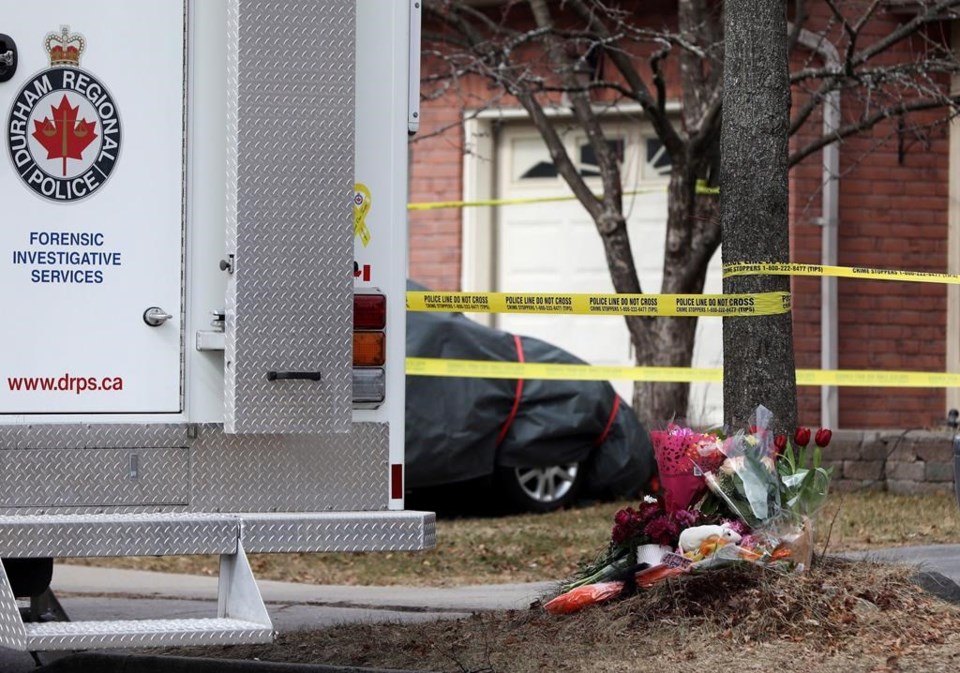The grief and guilt Victoria Pejcinovski felt after her mother and two siblings were killed left her longing to "escape" reality, court heard Friday, after the man found guilty of the murders was escorted out of the room for interrupting victim impact statements.
The young woman's statement was one of several read during a sentencing hearing for Cory Fenn, who had pleaded not guilty to second-degree murder in the 2018 deaths of his ex-girlfriend Krassimira Pejcinovski and her children Roy, 14, and Venellia, 13.
In the year after losing her family members at age 16, Pejcinovski felt numb, she said in her victim impact statement. Then the pain of the losses sunk in, and to cope, she said she started engaging in "self-destructive" behaviours, such as smoking and drinking.
"That was the only escape of reality I could get," her statement reads. "Being a big sister, all I ever wanted to do was protect them. And I felt guilty for a long time because I wasn't able to."
The girl was not home at the time of the murders, having spent the night at her father's house.
Last month, Justice Howard Leibowich found Fenn killed all three victims in a rage on March 14, 2018, in Ajax, Ont., after Krassimira Pejcinovski broke up with him. The mother and her daughter were found stabbed to death, while the boy was strangled.
Fenn, who represented himself, argued he did not have the mental ability to commit the crimes, but did not call a defence.
Crown prosecutors have requested that Fenn not be eligible for parole for 72 years.
Second-degree murder carries a mandatory minimum sentence of life in prison with no parole eligibility for 10 years, to be served either consecutively or concurrently. The Crown said Fenn should not be allowed to apply for release for 22 years in Krassimira Pejcinovski's death, and for 25 years in Venellia's and Roy's.
Crown attorney Mike Newell said the time it took for Fenn, after initially attacking his ex-girlfriend, to walk to another room and grab the knife he would use to kill her, accounts for the longer period of ineligibility.
"It takes this offence to the moral blameworthiness that is close to that of a first-degree murder," Newell said.
Fenn has indicated he'd like the minimum period of parole ineligibility, though he declined to make submissions Friday.
"Ten years would be perfect, right?" Fenn said to the judge when he was found guilty last month.
Fenn watched Friday's sentencing hearing by video from another room in the Oshawa, Ont., court house after being booted from the courtroom for interrupting the first victim impact statement.
A family friend was reading a statement from the children's paternal aunt when Fenn interrupted.
In the statement, Natasha Pejcinovski said the grief continues to colour her every experience, even aspeople have expected her to "deal with" it.
She said she never told her mother, the children's grandmother, about the murders.
"I had to keep the fact of their deaths from my elderly, medically frail mother for over two years until her death," she said. "My heart broke every time when she asked if I'd spoken to the children or Krissy."
Natasha Pejcinovski alsorecalled picking out a pink-and-white dress for her younger niece to wear in her casket.
"I had to search for a scarf to go with her outfit because the funeral home had told me that her throat was not able to be exposed due to horrific injuries," the friend was reading.
Fenn interrupted: "Don't blame me, lady."
The case will return to court on April 5, when Leibowich will either deliver his sentence or delay his decision while he awaits a key Supreme Court of Canada decision on the constitutionality of consecutive sentences.
The Quebec Court of Appeal overturned the 40-year period of parole ineligibility for Alexander Bissonnette, who pleaded guilty to six counts of first-degree murder after killing six people at a Quebec City mosque in 2017.
This report by The Canadian Press was first published March 18, 2022.
Nicole Thompson, The Canadian Press

